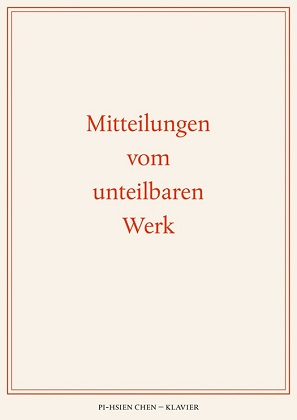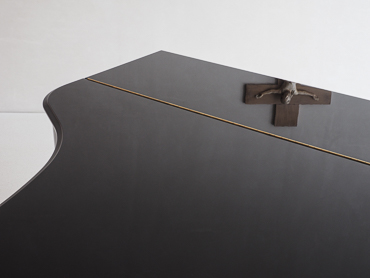01/17 Series of Concerts
January – July 2017
Notifications of an Indivisible Work
Pi-hsien Chen – Piano
In the course of this monographic series of concerts, Pi-hsien Chen will be presenting one outstanding composer of European Music History at a time, elucidating their unique traits of character as reflected in their –indivisible- work. In doing so, she will carefully explore the question of how construction and sentiment depend on each other in a work of art. »Within every artistic expression, we’ll find both an act of inclusion as well as one of exclusion. Through the intensity and coherence of such an experience we get literally guided into the work of art itself – which, at the same time, keeps its distance and the dignity of its art. ‚Individual’ may refer to the Undivided, but also carries the meaning of ‚non-participation’. It is precisely that space between opening up and closing in where our experience of art is taking place.« (Pi-hsien Chen). In her play, Pi-hsien Chen explores the present and the contemporary within classical music.
26 January 2017, 6 p.m.
Felix Mendelssohn Bartholdy
Piano trios Op. 49 D Minor (1839) and Op. 66 C Minor (1845)
Willi Zimmermann – Violin / Pi-Chin Chien – Violoncello
»When performing together with Pi-Chin Chien and Willi Zimmermann I find myself not only admire their play, but also their instruments (an Stradivari violin and a Amati cello). To me, Mendelssohn’s music moves along a knife’s edge between pain and consolation, as it were.« (Pi-hsien Chen)
16 February 2017, 6 p.m.
Johann Sebastian Bach
The Art of the Fugue (1747–1750, unfinished)
»Bach’s Art of the Fugue is for me the highest form of knowledge, filled with Christian meaning and number symbolism. Its musical content is comparable to that of a Passion. In this work, Bach firmly established his legacy of counterpoint composing. The Art of the Fugue marks the highest execution of recognizable polyphony: it is the vibrant independence and the dependence of several voices at the same time.« (Pi-hsien Chen )
16 March 2017, 6 p.m.
Wolfgang Amadeus Mozart
Variations and Piano Pieces
»When composers improvise, variations do arise: a theme inspiring to alteration, embellishment, and extension is set to be modified. Throughout Mozart’s variations, his communication with notes is turned and condensed into actions, quite similar to the individual parts in his operas, which are always met with a wise, elucidating ending. « (Pi-hsien Chen)
4 May 2017, 6 p.m.
Arnold Schönberg
Piano Solos op. 11, 19, 23, 25 and 33 a and b
(composed between 1909 and 1933)
»Schönberg’s music remains difficult to this day, particularly since it does not shy away from shaping rather complex sensations with an expressive atonality. To Schönberg, expression is of utmost importance, thus challenging the audience in a rather demanding way. « (Pi-hsien Chen)
29 June 2017, 6 p.m.
Franz Schubert
Three Sonatas
Sonata E-flat major D 568, Op. posthumous 122 (1817)
Sonata E major D 566 (1817)
Sonata G major D 894 (1826)
»Schubert knew he wouldn’t have much time left und that he had to carry on writing – on and on: ‚ A stranger I arrived, a stranger I depart ...’ , close to death.« (Pi-hsien Chen)
20 July, 6 p.m.
Domenico Scarlatti
Sonatas
»Having followed his student, the Portuguese Princess Maria Bárbara to the Spanish court, Scarlatti went on composing for her, all in all more than 550 sonatas. I find myself fascinated by the surprising as well as daring changes within his music. He was clearly inspired by plain folk music such as Flamenco and traditional folk songs, and yet his works are distinctly splendid, elegant, and aristocratic in style.« (Pi-hsien Chen)
Tickets: € 10 / 8,- | Limited seating capacity. Please reserve through KolumbaTicket@erzbistum-koeln.de
Notifications of an Indivisible Work
Pi-hsien Chen – Piano
In the course of this monographic series of concerts, Pi-hsien Chen will be presenting one outstanding composer of European Music History at a time, elucidating their unique traits of character as reflected in their –indivisible- work. In doing so, she will carefully explore the question of how construction and sentiment depend on each other in a work of art. »Within every artistic expression, we’ll find both an act of inclusion as well as one of exclusion. Through the intensity and coherence of such an experience we get literally guided into the work of art itself – which, at the same time, keeps its distance and the dignity of its art. ‚Individual’ may refer to the Undivided, but also carries the meaning of ‚non-participation’. It is precisely that space between opening up and closing in where our experience of art is taking place.« (Pi-hsien Chen). In her play, Pi-hsien Chen explores the present and the contemporary within classical music.
26 January 2017, 6 p.m.
Felix Mendelssohn Bartholdy
Piano trios Op. 49 D Minor (1839) and Op. 66 C Minor (1845)
Willi Zimmermann – Violin / Pi-Chin Chien – Violoncello
»When performing together with Pi-Chin Chien and Willi Zimmermann I find myself not only admire their play, but also their instruments (an Stradivari violin and a Amati cello). To me, Mendelssohn’s music moves along a knife’s edge between pain and consolation, as it were.« (Pi-hsien Chen)
16 February 2017, 6 p.m.
Johann Sebastian Bach
The Art of the Fugue (1747–1750, unfinished)
»Bach’s Art of the Fugue is for me the highest form of knowledge, filled with Christian meaning and number symbolism. Its musical content is comparable to that of a Passion. In this work, Bach firmly established his legacy of counterpoint composing. The Art of the Fugue marks the highest execution of recognizable polyphony: it is the vibrant independence and the dependence of several voices at the same time.« (Pi-hsien Chen )
16 March 2017, 6 p.m.
Wolfgang Amadeus Mozart
Variations and Piano Pieces
»When composers improvise, variations do arise: a theme inspiring to alteration, embellishment, and extension is set to be modified. Throughout Mozart’s variations, his communication with notes is turned and condensed into actions, quite similar to the individual parts in his operas, which are always met with a wise, elucidating ending. « (Pi-hsien Chen)
4 May 2017, 6 p.m.
Arnold Schönberg
Piano Solos op. 11, 19, 23, 25 and 33 a and b
(composed between 1909 and 1933)
»Schönberg’s music remains difficult to this day, particularly since it does not shy away from shaping rather complex sensations with an expressive atonality. To Schönberg, expression is of utmost importance, thus challenging the audience in a rather demanding way. « (Pi-hsien Chen)
29 June 2017, 6 p.m.
Franz Schubert
Three Sonatas
Sonata E-flat major D 568, Op. posthumous 122 (1817)
Sonata E major D 566 (1817)
Sonata G major D 894 (1826)
»Schubert knew he wouldn’t have much time left und that he had to carry on writing – on and on: ‚ A stranger I arrived, a stranger I depart ...’ , close to death.« (Pi-hsien Chen)
20 July, 6 p.m.
Domenico Scarlatti
Sonatas
»Having followed his student, the Portuguese Princess Maria Bárbara to the Spanish court, Scarlatti went on composing for her, all in all more than 550 sonatas. I find myself fascinated by the surprising as well as daring changes within his music. He was clearly inspired by plain folk music such as Flamenco and traditional folk songs, and yet his works are distinctly splendid, elegant, and aristocratic in style.« (Pi-hsien Chen)
Tickets: € 10 / 8,- | Limited seating capacity. Please reserve through KolumbaTicket@erzbistum-koeln.de

